Nothing is as unique or as distinct as the role of Greek life on college campuses.
Twenty percent of UNC’s undergraduate student body is involved in Greek life, which consists of 61 different organizations. From parties to philanthropic events, the role of fraternities and sororities on campus does not go unnoticed.
Greek life itself is deeply entrenched in our University institutions, the social lives of students and physically on campus through the presence of houses. This is especially true of large public institutions with long histories, such as UNC, where Greek life dates back to 1851. From parties to philanthropic events, the role of fraternities and sororities on campus does not go unnoticed.
Despite these perceived social benefits, the case against Greek life is stacked against it. Most recently, the uncovering of a $1.5 million national drug trafficking operation, which implicated three UNC fraternities, exposes the fundamental weaknesses of Greek life organizations.
It should come as no surprise that involvement in Greek life is inaccessible. These organizations are exclusionary by nature, but the real problem is bigger than bid day. Greek organizations were not desegregated until the 1960s, and even then, white members were prioritized during recruitment.
As recently as 1963, seven UNC fraternities had membership restrictions ranging from “socially acceptable” members to “white Christians only.” Greek organizations have a history of excluding members based on race, and remain predominantly white institutions today.
Greek life also discriminates by class. Membership dues are a barrier to entry, especially at UNC, where in-house dues can be up to $4,900 per semester. Panhellenic scholarships and grants are available, but typically only relieve a small portion of this hefty financial burden. We can see how this obstacle prevents low-income students from participating — a 2013 survey found that only six percent of Greek life members would consider themselves to be low-income, while 72 percent were upper- or middle-class.
Sexual assault is an epidemic on college campuses, and Greek life perpetuates the issue. Women who are in sororities are 74 percent more likely to be victims of sexual assault than women who are not. At the same time, men who are in fraternities are three times more likely to commit sexual assault than men who are not.
The COVID-19 pandemic has further demonstrated how Greek life enables dangerous behavior. One Instagram page is plastered with images and videos of parties held in Chapel Hill, including in fraternity and sorority houses, despite school and state orders to limit gathering sizes during the pandemic. It appears Greek organizations value the thrill of a party over the well-being of the community when they violate COVID-19 guidelines to host events.




